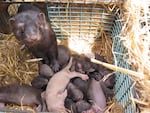
A mink and her kits. The Oregon Department of Agriculture is requiring mink ranchers to vaccinate their animals against COVID-19 this summer.
Courtesy Fur Commission USA
The Oregon Department of Agriculture has filed a temporary emergency rule requiring all mink ranchers to vaccinate their animals against COVID-19.
State Veterinarian Dr. Ryan Scholz said state officials are looking to stop the virus from mutating in mink and being passed back to humans.
“ODA is taking the necessary precautions to reduce the risk of infection in captive mink, as well as reduce the risk of potential mutation of the virus and the potential for virus transmission back to humans,” Scholz said in a news release.
“It is critical that owner/operators vaccinate their mink against the virus. In addition, ongoing surveillance testing will provide assurance that the vaccine is effective and infection has not occurred on the farms.”
The state has given ranchers until the end of August to vaccinate.

A mink farm. Oregon has 11 active mink farms, making it the fourth-largest pelt-producing state in the country.
Courtesy Fur Commission USA
Michael Whelan with the Fur Commission USA said his group fully supports the move and ranchers have inoculated about 500,000 mink so far — or half the population.
“We realize how important it is to have the mink vaccinated because they are susceptible to numerous human and wildlife borne diseases,” Whelan said.
Second shots are scheduled to be delivered later this month. It costs about 70 cents per shot, plus labor, for each mink.
In addition, any person holding a captive mink in Oregon is required to participate in surveillance testing for SARS-CoV-2.
A 2020 report by the Fur Commission USA counts 11 permitted mink farms in Oregon with an estimated 438,327 animals. That makes Oregon the fourth-largest pelt-producing state behind Wisconsin, Utah and Idaho. Eight of Oregon’s mink farms are in Marion County, with two in Clatsop County and one in Linn County.
The U.S. fur industry was valued at $82.6 million in 2018 and produced 3.1 million pelts.
